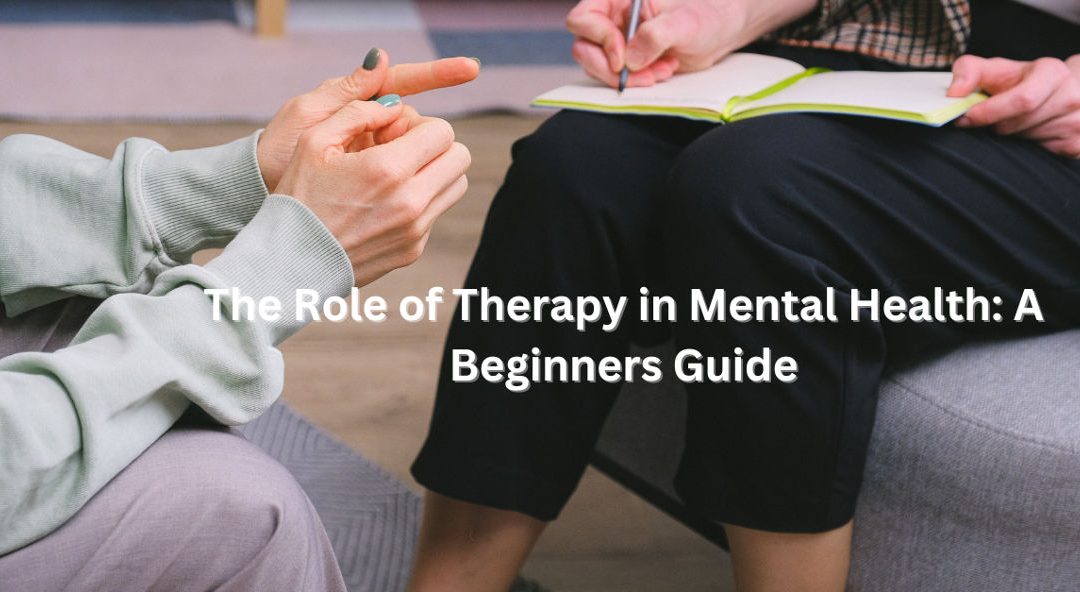The Role of Therapy in Mental Health: A Beginners Guide
Introduction
“You’re not broken. Your human. And therapy might be the most empowering choice you can make for your mental health.”
Mental health problems are more prevalent than ever in today’s hectic world. Chances are you have dealt with stress, anxiety, or depression and thought you were the only one. Well, let me tell you something: you’re not alone, and treatment could be the cure. Mental health therapy has become an essential resource for people negotiating the challenges of contemporary living. Anyone who wishes to better understand himself or herself, to manage stress, or to improve his or her emotional well-being can benefit from it; it is not limited to those with serious mental health problems.
Mental health therapy serves a purpose, and this blog will explain its role in the mental health process, various approaches that it uses, and surprising ways it can be helpful in a situation where you have wondered if it can help you or are unsure of where to begin.
What is Mental Health Therapy?
Mental health therapy is a professional treatment designed to help individuals overcome their emotional and mental struggles. Therapy will provide you with a safe and supportive environment in which you can discuss your thoughts, feelings, and actions, regardless of whether you are experiencing stress, anxiety, or something much more serious. In addition to healing, the goal is to equip you with the tools necessary to manage life’s challenges.
Do you know that one in every five adults lives with a mental disorder every year? But for all the vastness of such data, a greater percentage of this population prefers to stay away and not receive such help. A therapist will basically act as the bridge connecting you to those useful resources which, when sought for, may change your mood regarding your emotions or even bring in quality improvement toward life.
What Makes Therapy a Good Option?

Imagine carrying some heavy weight around you all the time. That is exactly how mental illness feels. What therapy does for you is provide a support group to help lift that burden off your back, understand its cause, and develop productive coping mechanisms.
Coping with stress and anxiety
Techniques may serve to alleviate the feeling of losing control, especially when stress and anxiety are lessened through the examination of causes as well as the application of useful techniques.
Improved Emotional Well-being

You can learn how to cope with emotions such as sorrow, irritation, or anger through therapy. You will be taught the healthiest ways of understanding, accepting and expressing your emotions.
Better Emotional Well-being
You can cope with emotions such as sorrow, irritation, or anger with the help of therapy. You will learn healthy ways to understand, accept, and express your emotions. Here are
some ways that treatment enhances mental health
Better Coping Skills
Life is filled with challenges, but therapy will help you become stronger. Therapy will not make you feel overwhelmed by the situation; instead, it will equip you with the right skills to cope and overcome obstacles.
Better Connections
Mental health therapy can aid in improving communication and conflict resolution skills. If ever you have had difficulty in relationships, whether romantic, family, or professional, therapy can help see certain patterns that contribute to destructive dynamics.
Popular Therapeutic Techniques
Therapy is not a one-size-fits-all proposition. Therapists use different techniques based on your needs and goals. Let’s take a look at some of the most popular therapeutic techniques:
Cognitive behavioral therapy (CBT)
The most widely used therapy is cognitive behavioral therapy, which requires you to become aware of and change any distorted and harmful ways of thinking that affect your emotions and actions. It is best suited for the problems of stress, anxiety, and depression.
Dialectical Behavior Therapy (DBT)
DBT is a method of helping highly emotion able individuals to control their emotions, develop healthier relationships, and become more mindful.
Psychodynamic Therapy
This approach looks into unconscious processes and past experiences to gain an understanding of emotional issues in the present. Perfect for people who want to explore underlying issues that might have their roots in early life or childhood.
Humanistic Counseling
Humanistic therapy helps you focus on your best self by placing emphasis on personal growth, self-actualization, and creating positive self-concept.
Therapy Address Relatable Issues
Think about how worried you have been on those sleepless nights or how the uncertainty prevents you from acting. You may wonder how to cope with this internal conflict or whether anyone actually understands how you feel. Actually, therapy is designed to help you deal with the problems you face day in and day out.
Overwhelm at Work
If you are burnt out or anxious because of work, therapy can help you find healthy boundaries and ways to handle stress.
Relationship Issues
Therapy can help you communicate better and even work through solutions to problems affecting your emotional well-being with a spouse, family, or friends.
Feeling unmotivated or stuck
Have you ever felt that you’re just running on autopilot and unable to make any progress? Therapy can help you become more motivated and clear-headed by indenting though blockages and helping you develop more positive goals.
Benefits of Therapy for Mental Health
Still wondering, “But will therapy really help me?” Consider these reasons to think about it:
Personalized Attention
A therapist is there to give you their full attention, which is something that friends and family just can’t do. Therapy provides you with an objective professional perspective that will help you find meaning in your difficulties because it’s hard sometimes to see the bigger picture when you are wallowing in your feelings.
Long-term benefits
Therapy is not a Band-Aid solution; it makes you grow, addresses the underlying issues, and develops the skills you need to face challenges in the future.
Facts and statistics about mental health and therapy
The World Health Organization (WHO) states that about 1 billion people word wide are affected by some form of mental health disorder, and 47% of those with anxiety or depression have found therapy to be an effective treatment. Studies have shown that 75% of patients who have undergone psychotherapy report improvement in their mental health. Such statistics show the increasing demand for mental health and the positive impact therapy will have on those who need to change their emotional scenario.
Conclusion
The “mentally ill” are not the only ones who benefit from therapy; everyone who wants to have a more balanced, healthy life can use it. Therapy can give you the support and direction you need to succeed, whether you’re struggling with stress, depression, or just need someone to talk to. Therapy could be the key to becoming a stronger, healthier version of yourself if you’ve been feeling alone or overburdened.
Don’t wait any longer to take further steps in your mental wellness journey. Contact a licensed therapist today and find out how therapy can help your mental health. Remember, asking for help is a sign of strength, not weakness. Your mental health matters; start now!

